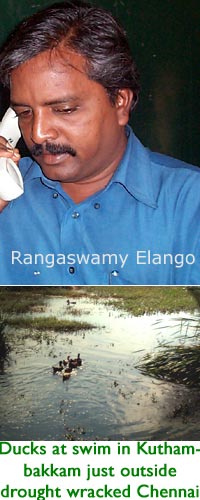Elango's development strategy is to bring invisible people over the line and make them participants
In a nation where collective finger pointing at politicians, grieving at the slowness of democracy and deriding India itself are fashionable, Rangaswamy Elango is an object lesson. He is an engineer for whom the outer world lay open. He chose to return to his village. He was born a Dalit, a people who have many justified grievances with Indian society. He chose to harmonise passions. He had choices enough to stay away from the rough and tumble of politics, as most educated Indians are wont to. He chose it as the means to lead his village, Kuthambakkam to prosperity. He can spend his life basking in the successes he has wrought so far in Kuthambakkam. But he has chosen to evangelise village centred development. He is a family man with longings for his loved ones. But he lives a solitary life for his cause, Gram Swaraj [--the Autonomous Village]. Most of all, at a time when it is the vogue to belittle Gandhi, he adores the great man as the one who truly understood India. The career path of Rangaswamy Elango needs to be widely known. Just fifty more Panchayat leaders like him across India are enough as nodes from where sensible village development can radiate in all directions.
Well to do but ill at ease:
Elango was born on Nov 12,1960 in Kuthambakkam where his family has lived for close to a thousand years at least. They cherish the association an ancestor of theirs had with the great reformer philosopher Sri Ramanujar, who was born in Sriperumbudur, nearby. Despite being Dalit they have not felt alienated from mainstream Indian thought. Village realities of ghettoised living however, had seemed inevitable. Elango's family owned some lands and his father was a Government employee. So they were reasonably well to do, but young Elango grew up amidst squalor and hopelessness in the Harijan 'colony'. Drunken brawls, wife beating and wails of women and children were nightly fares in houses around his. An academically inclined Elango could not quite shut these out nor ignore the filth and the bogs as he picked his way to his school. His mind however filed these away.
"At lunch I saw my mates had nothing to eat," he recalls. "They would gulp glasses of water and pretend they were alright. I always shared my lunch box. But, there was never enough not did it seem a solution." His mind filed that away too. Walking back from school on hot days, through upper caste streets he found people were willing give him water but not to his mates. Was it because they knew he came from a sober family, was well washed and studious? His mind did some sums with this and the filed information and came to a rough conclusion at an early age. Later as he grew up, he redid those sums and realised what it added up to: there can be no individual happiness if there is misery all around.

